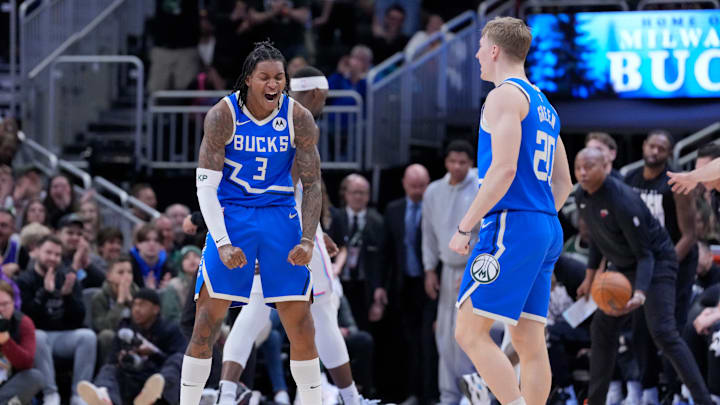Down the stretch last year, Kevin Porter Jr. was a weapon for the Milwaukee Bucks off the bench. Over his final eight games of the regular season, he took it up a notch by averaging 18.3 points per game, 5.1 assists, and 5.4 rebounds on 54/44/86 shooting splits. In the playoffs, the first of Porter's career, it took him time to get going. By the time he found a groove, the series was out of hand.
Entering 2025-26, many Bucks fans are excited for a possible Porter breakout. Even if he delivers, fairly or not, a sluggish postseason would sour any positive perception. At the end of the day, the final verdict on Porter's season will come down to matching AJ Green's example.
Porter will be judged by he levels up in playoffs
Green rose to the occasion last spring after going AWOL in his first postseason, back in 2024. No one expected him to bring the house down, but his 2.8 points per game failed to satisfy the expectations he had. This time, he averaged 11 points in the five games against Indiana. That figure would be higher without an outlier Game 2, where he had zero points in only 12 minutes on the floor.
Compared to the regular season, Green scaled up his contributions across the board. He was even more efficient on 3-point attempts, going 18-of-35 in the series. Elevated to the starting lineup in Game 5, he exceeded his normal minutes average in four of the five contests. Milwaukee needs Porter to have a bounce-back like Green.
Porter never had the chance to play in high-stakes games early in his career with Houston, so he gets something of a pass. He wasn't bad overall against the Pacers, but he had an uneven series. Like Green, he also disappeared for a night, going 0-for-5 for a single point in the Bucks' only win, the Gary Trent Jr. game.
Despite some similarities, they had very different series. Porter outperforming Green in box score averages isn't a useful basis of comparison. One, he did so inefficiently. And two, their roles - combo guard versus 3-and-D wing - are not the same. Porter carries far more responsibility within the offense, but he had an overall negative impact in Games 1-3. Next time, that can't happen.
Especially now, consistency is key. There is an obvious reason for Porter's elevated role later in the series. Damian Lillard's Achilles injury in Game 4 left Porter as the primary point guard. No more waiting and hoping for Dame Time. While he could still tighten up his playmaking, Porter answered the bell: 23 points on 17 shots plus five rebounds and six assists in Game 4. Including overtime, he played 80 minutes in the final two games.
Consider that his free trial. Lillard is no longer part of the picture, putting more pressure on Porter as the starting point guard. Three seasons ago in Houston, he averaged 19 points per game, but fans won't care that he's the Bucks' second-leading scorer if he can't produce consistently when it matters most. Following Green's example, he'll have to make a second-chance leap in his next crack at postseason play.
